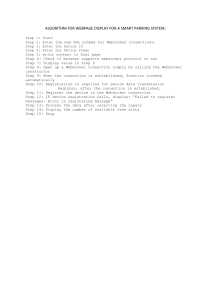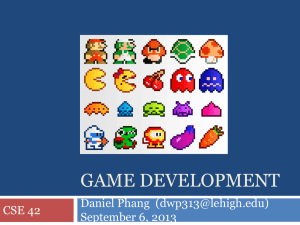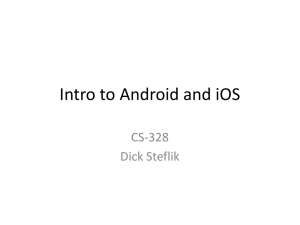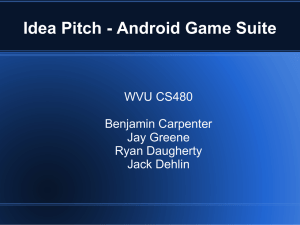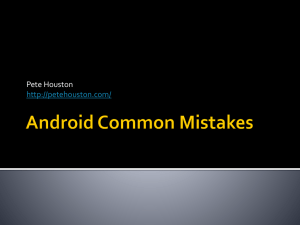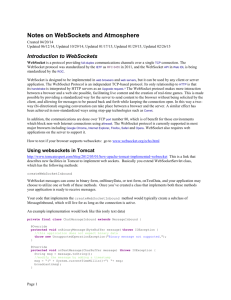Andoid and iOS Development with JAX
advertisement
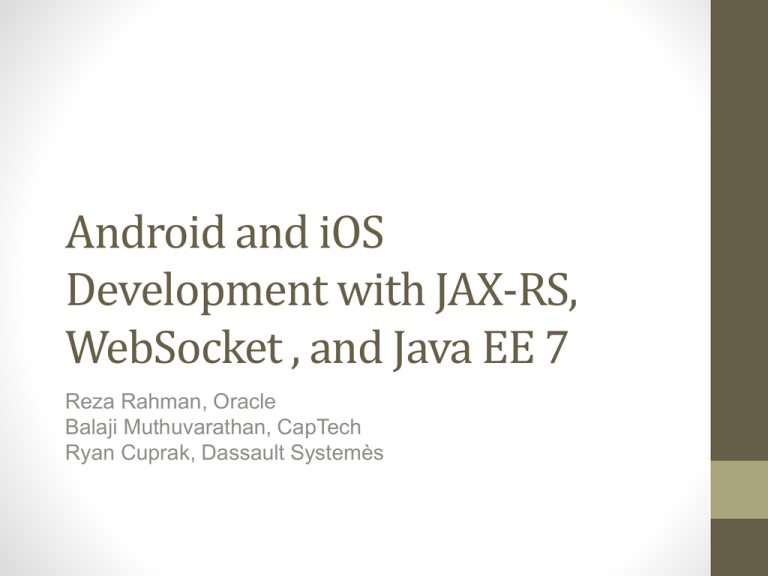
Android and iOS
Development with JAX-RS,
WebSocket , and Java EE 7
Reza Rahman, Oracle
Balaji Muthuvarathan, CapTech
Ryan Cuprak, Dassault Systemès
Agenda
•
•
•
•
•
•
•
Mobile Development
Java EE
iOS
Android
Summary
Demo
Q&A
https://github.com/m-reza-rahman/javaee-mobile
Mobile Platforms
• Dominated by Google’s Android and Apple’s iOS
platforms.
• Android’s US market share is about 52% against iOS’s 42%
• Windows Phone is at a distance 3rd place with about 4%
share
• Globally, Android’s market share is even higher
Mobile Development Models
• Native App
• Built for a specific platform
• Downloadable app
• Objective-C/xCode, Java/Android Studio etc.
• Mobile Web App
•
•
•
•
Service side apps that run in the device’s web browser
HTML 5, CSS3, JavaScript
jQuery Mobile, Sencha Touch
Responsive and Adaptive Web Designs
• Hybrid App
• Developed mostly using Mobile Web App technologies, but are
executed like a native app in a native (wrapper) container
• PhoneGap, ADF Mobile, IBM Worklight, AeroGear,
Appcelerator
Mobile Development Models…
•
Native App
•
•
•
•
Best user experience
Access all device/hardware capabilities
But, development/maintenance will have to be done for every target
mobile platform
Mobile Web App
•
•
•
•
•
•
Target multiple platforms from a singe code base
Low barrier to entry – low learning curve, nothing to download for
users
But, evolving HTML 5 standards and inconsistent adoption/support
impacts user experience and timelines
Access to device capabilities (such as accelerometer) is limited
Hybrid simplifies targeting multiple platforms with a single code base,
while maintaining access to device capabilities
But, native development may still be needed and performance may
also suffer slightly
Client/Server Connectivity
• Two main types – RESTful services and WebSockets
• RESTful Services
• Client/server communication from mobile applications
commonly happens over HTTP, more often using REST
style services
• Stateless, lightweight, scalable
• Typically JSON over HTTP/HTTPS. XML could be used as
well
• Client initiates the request
• Commonly supported HTTP verbs include GET, POST,
PUT, and DELETE
• Uses existing web technologies and security standards
• Fully supported by Java EE and GlassFish Server
Client/Server Connectivity
(cont.)
• WebSockets
• Offers true bi-directional (full-duplex) communication over a
single TCP connection
• Initial hand-shake over HTTP, but subsequent conversations over
WebSockets
• Supports asynchronous, extremely low-lag communication
• Perfect for applications like chat and game
• Uses existing web technologies and security standards
• Supported by Java EE and GlassFish
Java EE 7/Mobile
Mobile Device
Java API for
WebSocket
JAX-RS
Java API for
JSON
JAXB
Bean Validation
Servlet
EJB 3
JPA
CDI
JMS
JTA
JCA
JAX-RS
• JAX-RS is the REST development API for Java
• Server and client
• Annotation based, declarative
• @Path, @GET, @POST, @PUT, @DELETE,
@PathParam, @QueryParam, @Produces,
@Consumes
• Pluggable and extensible
• Providers, filters, interceptors
JAX-RS Example
Java API for WebSockets
• High level declarative API for WebSocket
• Both client and server-side
• Small, powerful API
• @ServerEndpoint, @OnOpen, @OnClose,
@OnMessage, @OnError, Session, Remote
• Pluggable and extensible
• Encoders, decoders, sub-protocols
WebSocket Sample
WebSocket Sample (cont)
iOS Overview
• iOS provides built-in support for REST and JSON.
• Functionality can be augmented with external libraries like
RestKit.
• iOS has no built-in WebSocket support.
• External library required such as SocketRocket.
• SSL supported for both REST and WebSockets.
iOS and REST
RestKit – Configuration
•
•
•
•
•
•
RestKit: http://restkit.org
Apache License
Core Data Support
Object Mapping
Pluggable Parser
Support MIME types, multi-part submissions
iOS and REST
• RestKit – Configuration
iOS and REST
RestKit – Object Mapping Setup
iOS and REST
RestKit – Service Invocation
iOS and REST
NSURL Approach
iOS and WebSockets
Introducing SocketRocket
•
•
•
•
•
•
•
Open source library WebSocket library for iOS.
http://github.com/square/SocketRocket
Apache 2.0 License.
Comprehensive regression suite.
Supports secure WebSockets.
Implement proxy SRWebSocketDelegate.
Simple project integration.
iOS and WebSocket
SocketRocket Delegate Methods
• Message Message Callback
-(void)webSocket:(SRWebSocket*)webSocket
didReceiveMessage:(id)message;
• WebSocket Open Operation
- (void)webSocketDidOpen:(SRWebSocket*)webSocket
;
• WebSocket Connection Failed
- (void)webSocket:(SRWebSocket*)webSocket
didFailWithError:(NSError*)error;
• WebSocket Failed
- (void)webSocket:(SRWebSocket*)webSocket
didCloseWithCode:(NSInteger)code
reason:(NSString*)reason
wasClean:(BOOL)wasClean;
iOS and WebSockets
Using SocketRocket
Open Connection
Close Connection
Android
Delegate Methods
• Apache HTTPClient bundled with Android
• Rudimentary JSON library from json.org included
• Jackson
• GSON
• No out-of-box REST support
• Spring Android RestTemplate
• RESTDroid
• JAX-RS/Jersey Client APIs on Android?
• No out-of-box WebSockets support
• Autobahn Android
• Android WebSockets from CodeButler
• WebSocket/Tyrus Client APIs on Android?
Spring Android Rest Template
Android – HTTP Basic Authentication
import org.springframework.http.HttpAuthentication;
import org.springframework.http.HttpBasicAuthentication;
import org.springframework.http.HttpHeaders;
...
HttpAuthentication authHeader = new
HttpBasicAuthentication(username, password);
defaultHeaders = new HttpHeaders();
defaultHeaders.setAuthorization(authHeader);
Autobahn Android WebSockets Client
private final WebSocketConnection mConnection = new
WebSocketConnection();
...
mConnection.connect(wsuri, new WebSocketHandler() {
@Override
public void onOpen() {
mConnection.sendTextMessage("Hello, world!");
}
@Override
public void onTextMessage(String payload) {
Log.d(TAG, "Got echo: " + payload);
}
@Override
public void onClose(int code, String reason) {
Log.d(TAG, "Connection lost.");
}
});
Java EE + Android/iOS Demo
https://github.com/m-reza-rahman/javaee-mobile
Some Best Practices
• REST vs. WebSocket
• REST for the most part, WebSocket only for full-duplex,
bidirectional
• JSON vs. XML
• JSON hands down
• Where to store state
• Mostly on the client, synchronize/persist on the server
• API design
• Coarse grained, stateless, general purpose
• Security
• TLS, federated (OAuth), avoid sensitive data on client
• Development model
• Native -> Hybrid -> HTML 5?
Some Best Practices
• Testing
• Be-aware of data conversion issues: encoding, data
precision, etc
• Write unit tests for all target platforms.
• Use Java for baseline unit testing.
Best Practices
Tcpmon to troubleshoot (http://ws.apache.org/tcpmon/)
Summary
• Mobile space dominated by Android, iOS native
development
• The mobile client development model is still evolving,
perhaps towards HTML 5
• Communication to server side happens via REST and
WebSocket
• Java EE well positioned as a mobile backend, especially
with JAX-RS and the Java API for WebSocket
• You can use our demo code as a starting point
• There are some best practices to be aware of
• Most importantly, have fun!
Resources
• Java EE
• http://oracle.com/javaee
• Java EE Tutorial
• http://docs.oracle.com/javaee/7/tutorial/doc/home.htm
• Java EE 7 Containers
• GlassFish 4 (https://glassfish.java.net/)
• WildFly 8 (http://www.wildfly.org/) aka JBoss
• Reference Implementation
• http://glassfish.org
• http://java.net/projects/tyrus
• http://jersey.java.net
Resources
• RestKit
• http://restkit.org/
• SocketRocket
• http://corner.squareup.com/2012/02/socketrocketwebsockets.html
• Autobahn Android
• http://autobahn.ws/android
• Spring Android RestTemplate
• http://projects.spring.io/spring-android/
• CapTech Mobile Practice
• http://www.captechconsulting.com/services/systemsintegration/mobile-technologies
Q&A
• Source code:
• https://github.com/m-reza-rahman/javaee-mobile
• Questions:
• rcuprak@gmail.com
• @ctjava
• Upcoming changes to demo:
• Android Studio/Gradle
• Cocoa Pods
